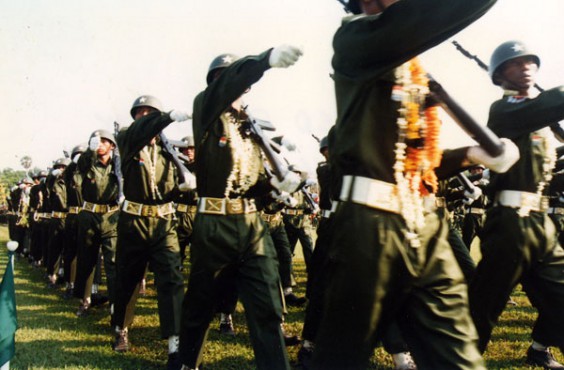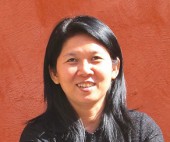There is No Collective Dream in Myanmar

For years, the Burmese have only dreamed about getting out from under the military regime, and little else about their country's future. Photo via Flickr user: Stephen Brooks.
Although the people of Myanmar have individual dreams, there is no collective dream about what kind of community we would like to live in and how we might build it.
Myanmar never tried to get rid of imperialism until many decades had passed as a colony under British rule. According to historian Dr. Than Tun, in late 1919 the General Council of Burmese Associations, a political and religious organization, stated that it would be loyal to the King of England, as they had won World War I. Were the people of our country still eager to bow to a capable king for change in their lives even though they were colonized? Relying on individual ability to change a whole community was a by-product of imperialism. As a colonized country, Myanmar’s people did not know how to rely on their own abilities to create social change.

- Literature is an echoing voice of people’s thought. Myanmar literature and media have suffered a lot along with people during five decades of censorship. The majority of Myanmar’s population are voiceless, and many untold stories are yet to be discovered by local or international writers and journalists. Here let’s try to find and listen to what problems people are feeling, thinking, and facing regarding freedom of expression in everyday lives in Myanmar.

- Ma Thida is a Burmese human rights activist, writer, medical doctor, and former prisoner of consciousness. In 1993, she was sentenced to twenty years in Burma’s Insein Prison for actively supporting the Nobel laureate Aung San Suu Kyi. She served six years of her sentence, largely in solitary confinement and was released through the efforts of Amnesty International and PEN International. She has published nine books in Burmese and English, including The Sunflower (1999), The Roadmap (2011), and Sanchaung, Insein, Harvard (2012), a memoir. Ma Thida is currently president of PEN Myanmar.
In the late 1920s, students went on strike at Yangon University, against a British colonial administration that wanted to make the students its servants. That strike initiated the very first nationwide strike after King Thibaw was dethroned in the Third Anglo-Burmese War. Yangon University student leaders also founded the Red Dragon Book Club, which played a crucial role in teaching the community about the rest of the world’s current affairs and political systems. After the Book Club’s founding, Aung San and his comrades created a more strategic plan to gain independence from the British.
Before he could convince the people of Myanmar of the kind of community that would be possible after independence, Aung San and his cabinet members were assassinated in July of 1947. Independence followed in January of 1948. Post-independence leaders could neither reach a consensus on a political system for the country, nor create a collective dream for the people. We ended up with socialist coup d’etat in 1962.
Under the Burmese Way to Socialism, citizens were forced to adopt the dream of socialism without knowing what it entailed. However, some ethnic groups decided to leave socialism and the country. When citizens inside Myanmar started doubting the socialist rule, there were many unsuccessful, yet significant, demonstrations aimed at knocking down the regime. In 1988, people rose up against General Ne Win’s one-party socialist regime. However, they simply wanted to get out from under regime and beyond that, had no specific dream. The country again came under the rule of a military government in September 1988.
Since 1988, Myanmar has wanted to claim democratic independence from its military regime. For them, democracy simply means freedom, and nothing more. For five decades, beginning with the 1962 coup d’état, censorship and military propaganda has prohibited generations from learning about democracy and democratic nations. Myanmar now has a charismatic leader, Aung San Suu Kyi, the descendant of the old intellectual hero Aung San. Without knowing about political systems and its functions, people think that Aung San Suu Kyi can bring democracy to Myanmar if she becomes the president or authority. Even in the present day, our people have no collective idea about how to build a democratic society and what their contribution to it might look like.
As you might know, Aung San Suu Kyi’s political party, the National League for Democracy (NLD), won majority seats in the 1990 election, even though the military still ruled. After all, because of illegitimate and brutal crackdowns on the opposition parties, the military regime made the infamous, undemocratic 2008 constitution the basis for the 2010 election campaign. In 2012, NLD party members were elected to 43 seats in the Burmese parliament.
However, to this day, none of the three pillars of our (so-called) reformed government have encouraged Myanmar’s citizens to dream together and build a society in peaceful way. For that reason, the role of the Burmese citizen is still very weak. The government’s culture of dominance is overwhelming. The executive branch wants to dominate the other pillars, and then the legislative branch tries to do so as well. Citizens remain victims, subject to the rule of each of these powers.
Indeed, our people are perceived as “graceful under pressure” but now they may be seen as “grieving under glamour.” People struggle to build trust between the government and citizens, between the military and civilians, between Burmese nationals and other ethnic groups, between Buddhists and Muslims, and so on. The citizens of Myanmar do not know how they can cooperate to rebuild our society, while instilling the principles of democracy in it.
We, the people of Myanmar, urgently need one collective dream to move our society from the past into the future. The leader who can successfully introduce this to our people is still a question mark.





One Comment on "There is No Collective Dream in Myanmar"
A thoughtful and penetrating analysis of present day Burmese society struggling from decades of misrule. It is almost impossible to expect this complex land with such a troubled past to knit a united democracy out of its fragmented elements but the citizens of Myanmar are certainly entitled to a share of peace and prosperity finally.